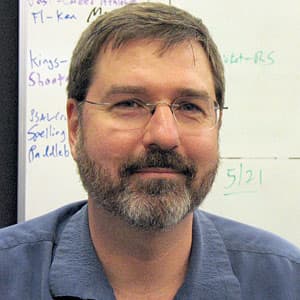Advertisement
Chess City: 'A Monument To An Impossible Dream'
Resume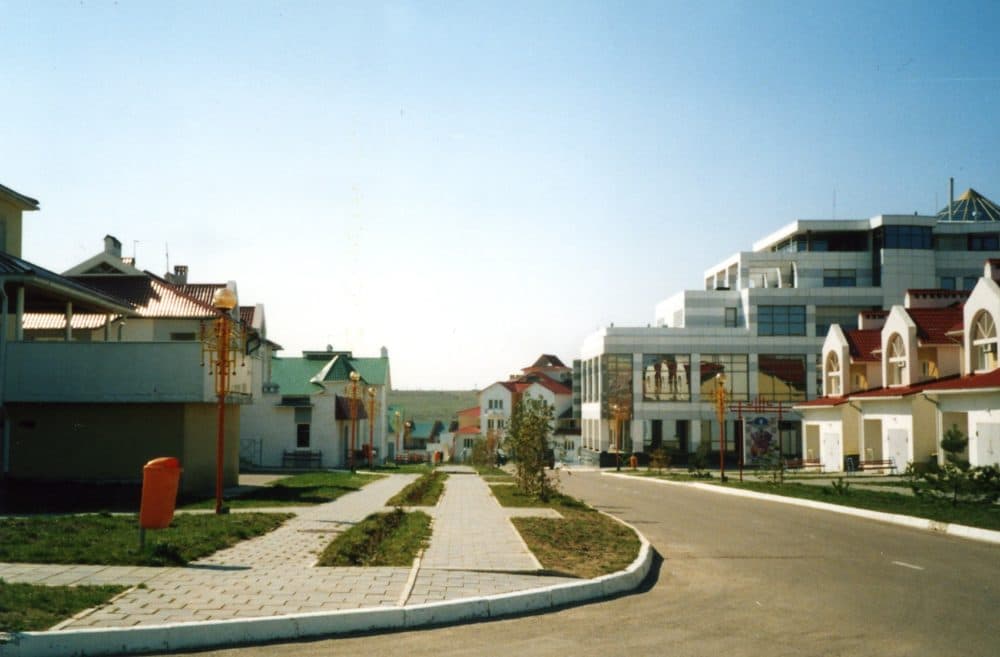
The Russian republic of Kalmykia sits near the Caspian Sea’s western shore, not far from the border with Kazakhstan.
It’s not a popular tourist destination. But if you were to travel to Kalmykia’s capital, you’d find a spectacular city-within-a-city dedicated to one of the world’s oldest games.
This unusual place comes with a controversial — and deadly — past.
'Play Chess'
In 2002, writer Daniel Kalder visited Kalmykia with a couple of friends.
On the drive from the airport to the capital city of Elista, they passed public service posters that lined the road — holdovers from Kalmykia’s Soviet past.
" 'Call your parents,' " Kalder recalls. "I remember there was a lot of adverts that said, 'We buy hair.' There was another one that said, 'Play chess.' "
Kalder says there was little information about Elista online or in travel brochures, so he wasn’t exactly sure what he’d find there. But, after a few days of wandering around, he found what he was looking for: a place called "Chess City."
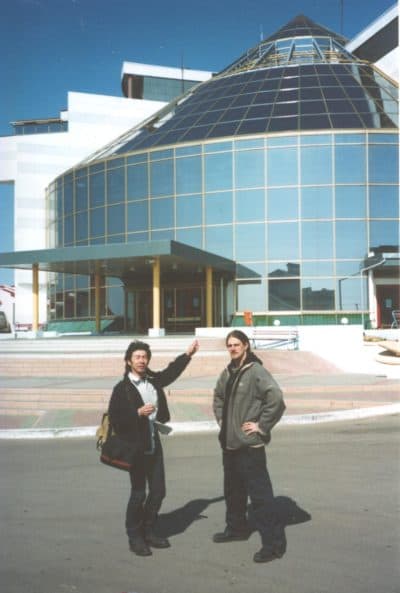
"And there was kind of a gate that you pass through," Kalder says. "It kind of looked a little bit like a modern housing site. Clean, shiny houses. Not tower blocks or this kind of grim, depressing Soviet architecture. It was this kind of gleaming, European-style subdivision with what looked like a shopping center in it. But was actually the Palace of Chess."
'It Was Really Almost Hallucinatory'
The Palace of Chess is a five-story structure with a modern glass facade. Its shape suggests the traditional yurt used for centuries by the formerly nomadic Kalmyk people.
"There was a young couple, sort of half making out on the steps when we arrived," Kalder says. "Which is really strange, because it was completely abandoned. Maybe that's why they were there.
"So we kind of went up the steps and went through these glass doors, and there was a security guard at the door. And he was shocked, very surprised, to see us. I guess he was there to protect the Palace of Chess. From what wasn't clear."
The guard asked why they were there. Kalder and his friends said they wanted a tour. The guard was skeptical. But, after a bit of convincing, he took Kalder and his friends inside.
"It was really empty," Kalder says. "It was like a ghost ship. The ground floor was just a big open space."
They walked upstairs to a gallery, where they saw a photograph hanging on a wall. It was of the Palace of Chess in the late ‘90s, when it was still under construction.
"And this really familiar-looking guy with a beard, who was looking at the construction site with great interest," Kalder recalls. "And then I realized that it was Chuck Norris."
Norris had visited Elista when Chess City was being built. Nobody seems to know exactly why he was there.
Naturally, I tried to get Norris on the show, but my dreams were dashed.
But back to the Palace of Chess.
"It was just bizarre," Kalder says. "It was just weird. It was really almost hallucinatory. They had these chess tables, but they didn't have any pieces, just these tables set up for games that were never going to be played.
"And then at the very top, there was, like, exhibits of famous grand masters, of famous Soviet chess players. That was it, really. I just kept wandering around in this abandoned glass pyramid. A monument to an impossible dream."
That dream originated with Chess City’s founder, former junior chess champion Kirsan Ilyumzhinov.
Two Presidents In One
"He's an unusual character, and a very controversial character," Kalder says. "When he came of age, it was sort of in the 1980s, perestroika, when things were changing. And so he went into business importing cars, and he made quite a lot of money. And so, by the early 1990s, he was already a millionaire."
The Soviet Union fell in 1991. Two years later, Kirsan Ilyumzhinov was elected president of Kalmykia.
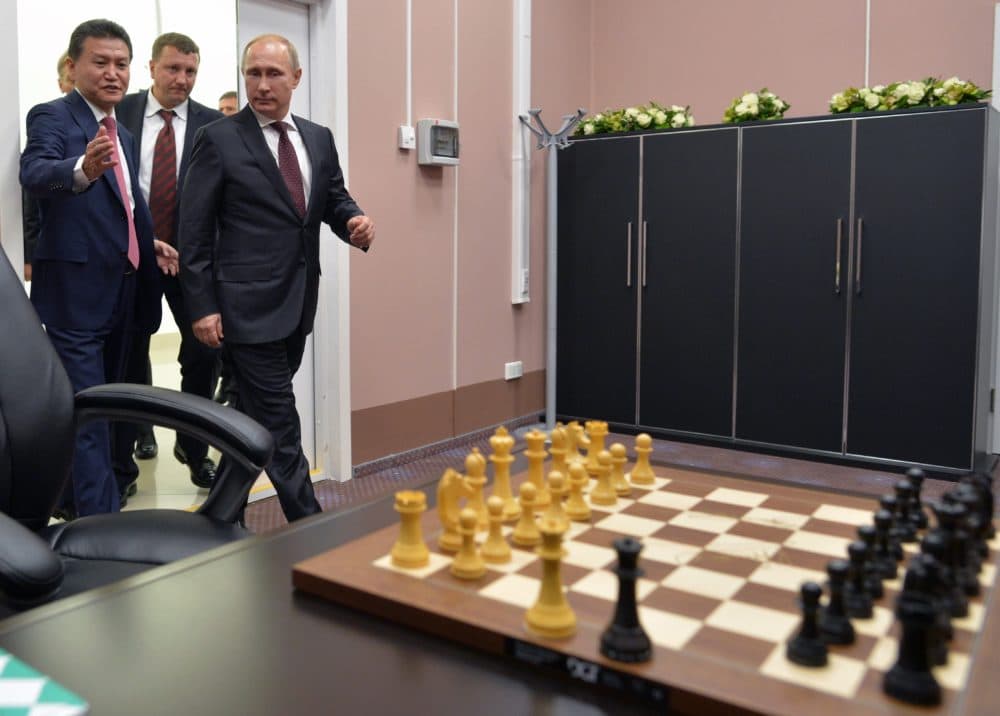
"He made all the kids in Kalmykia learn chess, compulsory chess lessons," Kalder says. "He wanted chess to be an Olympic sport. He wanted a billion people to be playing chess."
In 1995, while still serving as the leader of Kalmykia, Ilyumzhinov was elected President of FIDE, known in English as the World Chess Federation.
"And the World Chess Federation was in serious financial straits," Kalder says. "So they kind of looked to him to fix its financial problems and then kind of raise its profile in the world. Which he applied himself to with great gusto, with this really grand vision."
Ilyumzhinov believed that chess was a force for good in the world. So he came up with a plan to create Chess City. It would feature chess-themed sculptures alongside the Buddhist temples and statues of Lenin already there. The Palace of Chess would be the city’s opulent centerpiece.
But the shifting sands of the Eurasian Steppe make it a difficult place to build. Nobody knows exactly how much the project cost. Estimates run from $30 to $50 million. And Kalmykia is one of Europe’s poorest regions.
"To be honest, I cannot tell you how he got that funding."
Daniel Kalder
"To be honest, I cannot tell you how he got that funding," Kalder says.
Some claimed the money was diverted from regional food subsidies. But Ilyumzhinov believed he could boost his country’s economy by attracting world class events. He ordered that Chess City be ready in time to host the 1998 Chess Olympiad.
Meeting Ilyumzhinov
In September of that year, the world’s best chess players battled it out in the Palace of Chess. International grandmaster Gregory Kaidanov was there as a member of the U.S. team. Kaidanov and his teammates were greeted by Kirsan Ilyumzhinov.
"He was very unusual. Let's put it this way," Kaidanov says. "He gave us a bag of souvenirs, which included a watch with the name 'Kirsan' on it and a bottle of vodka, which was called 'Kirsan,' too. And some other little things. But almost every souvenir had his name on it. So I thought it was kind of funny."
Grandmaster Nick de Firmian was also a member of that 1998 U.S. team.
"We all got caviar. Because the Caspian Sea is there," de Firmian says.
"So you don't still have your watch or the vodka?" I ask.
"I believe that the team used the vodka to good cause during our efforts there," de Firmian answers with a laugh. "The watch — no, I don't have."
The players talked with Ilyumzhinov. He was full of stories. Some of them were … unusual.
"Kirsan told everyone that he was abducted by space aliens and taken up in their ship," de Firmian recalls. "And this is such a strange story to hear from somebody who's running many businesses, running a little country, someone in good stead with Putin. So that was a sort of strange, curious thing.
"Me, I was very happy to hear that Kirsan had talked to the aliens. I've seen movies like 'Independence Day,' where the aliens come down and bomb the whole U.S. So I thought it was good to have somebody who knew them personally."
Anyway, during that same meeting with Ilyumzhinov, de Firmian heard one of his teammates ask the president a startling question.
"One of our players, Yasser Seirawan, point blank asked him if he had anything to do with the murder."
Nick de Firmian
"One of our players, Yasser Seirawan, point blank, asked him if he had anything to do with the murder," de Firmian recalls. "And Kirsan answered, 'Well, certainly not me. I'm a Buddhist. I don't believe in violence.' "
Sending A Message
Just three months earlier, on July 7, 1998, the body of Russian journalist Larisa Yudina had been found in a pond near Chess City. She had written articles questioning where the money for the project had come from. She had accused Ilyumzhinov of corruption.
Yudina’s corpse had multiple knife wounds and a fractured skull.
"The fact that her body was found in a pond near Chess City was a message," says writer J.C. Hallman. "And I think the message was 'Don't investigate this. Don't interfere with what we're trying to do.' "
Still, the 1998 tournament went on. Russia won gold. The U.S. took silver.
Two years later, a couple of Ilyumzhinov’s aides were convicted and jailed for Yudina’s murder.
"But it was never acknowledged, either that he had overtly ordered that murder, or that he had created the environment that made it inevitable," Hallman says.
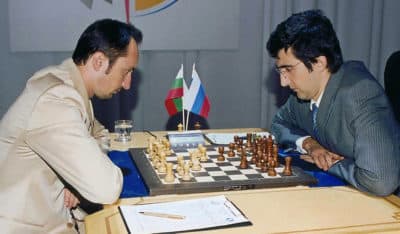
Hallman visited Elista not long after those convictions. He wanted to interview Kirsan Ilyumzhinov about chess ... and also about Yudina’s murder. One morning, he got the call to come to Ilyumzhinov’s office.
"You open one door and there's another door. And then you have to open the other door," Hallman says. "And then there is a big desk. And he had all kinds of paraphernalia to create an impression of greatness."
Russian and Kalmyk flags, Buddhist tapestries, precious stones and a portrait of Genghis Khan.
"Which was sort of like being allowed into his throne room," Hallman says. "You know, Ilyumzhinov is — he's not a tall guy. He's thin. But he does have a presence."
Hallman asked Ilyumzhinov about the nature of chess, and what the game meant to Kalmykia and to the world.
"There were 14 people sitting around a table, and we’re listening to him talk," Hallman says. "And, more or less unprompted, he comes out with this idea that aliens are going to arrive and we're going to teach them chess. And this is all going to become part of some new order of the universe in some way. And nobody was going to say anything about it, because he was the president."
Hallman decided not to ask Ilyumzhinov about the murder.
"I'm not a journalist," Hallman says. "You know, I was writing a travel narrative. And I felt like nothing was going to come of me confronting him about that, except that he would kick me out of the country, and I wouldn't get the rest of the story."
"I felt like nothing was going to come of me confronting him about that, except that he would kick me out of the country, and I wouldn't get the rest of the story."
J.C. Hallman
Wanting to pick up where Hallman had left off, I tried contacting Ilyumhinov to get his side of the story. There was no response to my request for an interview.
Kirsan Ilyumzhinov retired in 2010 after 17 years as president of Kalmykia. During that time, he kept company with dictators Saddam Hussein, Muammar Gaddafi, and Bashar al-Assad. Because of his associations, in 2015 the U.S. government put Ilyumzhinov on a list of individuals considered threats to national security. Some of his business dealings also violated FIDE’s code of ethics. In 2018, Ilyumzhinov was ousted after a 23-year run as FIDE president.
The 'Empty Glass Pyramid'
J.C. Hallman visited Chess City two years after it was built, and already the Eurasian Steppe had begun to creep back in. The sidewalks had started to crumble. Today, two decades later, the Palace of Chess remains largely empty. It’s now the site of occasional minor chess tournaments and weddings.
"And there's still a security guard, and there's still the picture of Chuck Norris," Daniel Kalder says. "It just stays there. Just kind of slowly rotting and crumbling on the edge of the desert."
It’s a fitting image for Ilyumzhinov’s failure to realize his vision of world peace and harmony through chess.
J.C. Hallman thinks there are lessons to be learned from all this.
"It's not a new idea that we can use sport or games to try to create a sense of national identity and goodwill and prosperity," Hallman says. "The Olympics gets used for this. Nevertheless, I think that when chess gets used for political ends, the more beautiful, artful side of it gets lost. And that Chess City might ultimately stand as a monument to what happens when you try to put something like chess to that kind of a distorted use."
As long as the Eurasian Steppe doesn’t claim it for good, Chess City will quietly stand as Kirsan Ilyumzhinov’s expensive reminder of the frailty of human aspiration and the dangers of unchecked ambition.
J.C. Hallman’s book is "The Chess Artist." Daniel Kalder’s travelogue is "Lost Cosmonaut: Observations of an Anti-Tourist."
This segment aired on March 21, 2020.
